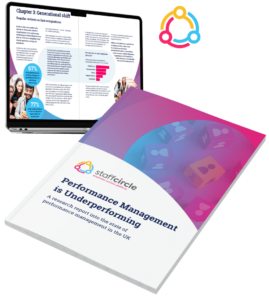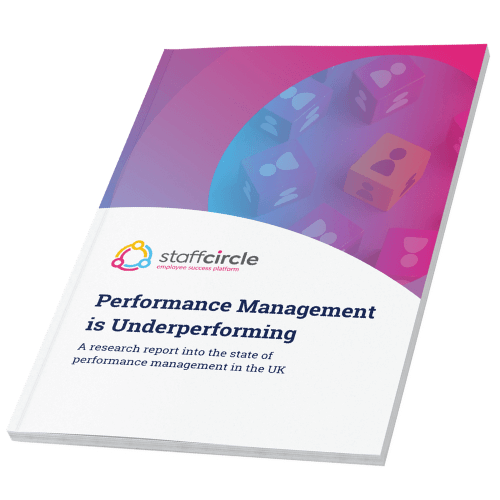What is effective performance management?
Imagine a workplace where your employees are not just present but actively engaged, motivated, and consistently performing at their best.
That’s the power of a successful performance management system.
It’s about more than just ticking off tasks; it’s about unleashing the full potential of your workforce.
To put it simply, effective performance management involves managing your team’s performance in a way that aligns organisation, individual and team goals.
Here’s the reality check: Many HR leaders find it challenging to give performance management the attention it deserves amidst the daily chaos of their tasks.
As a result, employees are “checking out,” and the risk of rising turnover has never been higher.
Successful performance management shouldn’t be a burden; it should be an essential part of your HR strategy.

What does good performance management look like?
So, what does good performance management actually look like?
It’s not a one-size-fits-all approach; rather, it’s a bespoke solution tailored to your organisation’s unique needs.
Something all great performance strategies have in common? They put individual employees at the centre of the strategy.
In a workplace with good performance management, expectations are crystal clear, feedback flows freely, and improvement is a continuous journey.
It’s an environment of fairness and transparency.
Every team member knows why their role is vital for business success.

Why is effective performance management important?
High attrition rates, disengaged employees, and the ever-pressing reality of cost-cutting.
These are the harsh realities facing people managers.
Effective performance management isn’t just a “nice-to-have”. It’s a lifeline that keeps your organisation profitable and your team productive.
By prioritising performance, you’re not just managing tasks. You’re nurturing relationships, fostering growth, and building a thriving organisational culture.

Performance management is underperforming
In a world where HR teams are constantly juggling multiple tasks, one often gets overlooked— performance management strategy.
In our research report, “Performance Management is Underperforming,” we delve deep into the issues plaguing performance management in the UK.
Poorly managed performance has a direct correlation with high attrition rates, and retention, productivity and profitability fears continue to rise.
Our study reveals the widespread nature of this problem and offers insights into why it persists.

Performance management key findings
- Checking In vs. Checking Out: A staggering 54% of employees say they would leave an organization if they didn’t receive regular feedback and communication.
- Invisible Employees: Outdated or inaccurate performance data plagues 49% of HR professionals, limiting their understanding of employees’ needs and experiences.
- Generational Shift: As Gen Z employees join the workforce, 67% of organizations are adjusting HR processes to meet their demands. Worryingly, a large percentage of employees don’t see these changes in action. Are people leads focusing on the wrong things?
- Driving High Performance: The report shows that HR teams using effective performance management systems like StaffCircle are powered by data accuracy, quick data access, and employee retention, reflecting the transformative power of technology in performance management.
Download to understand the state of performance management
By downloading our research report, you’ll:
- Stay Informed: Gain insights into the critical challenges affecting performance management and understand why an effective solution is more vital than ever.
- Solve Common Issues: Explore practical solutions to boost your performance management process effectiveness, reduce turnover, and keep your employees engaged.
- Embrace Change: Discover how HR teams are adapting to the demands of Gen Z employees and learn what your organisation can do to retain top talent.
- Leverage Technology: See how an effective performance management system like StaffCircle can revolutionise your HR processes and drive better business outcomes.
Don’t let your performance management challenges be a barrier to success.
Download our research report now and embark on the journey to transform your HR processes, retain top talent, and create a thriving workplace.
How Effective Performance Management is Changing in 2024
With Gen Z entering the workforce, the landscape of performance management is evolving rapidly.
Are you ready for this shift?
What is the future of performance management?
The future of performance management is dynamic and data-driven.
It relies on performance management tools like real-time insights, frequent check-ins, and personalised development plans.
In the not-too-distant future, an effective performance management system isn’t a once-a-year ritual but a continuous journey.
Constructive, documented feedback and performance conversations will be frequent as your morning coffee, and development plans are as personalised as your playlist.

How Gen Z is changing performance management
Gen Z is bringing fresh perspectives and higher expectations to the workplace. Their performance expectations are different.
Are you equipped to meet their demands, or are you at risk of losing them to competitors?
Gen Z isn’t just the future; they are the present.
They crave feedback, thrive on flexibility, relish ongoing performance conversations and seek opportunities for growth.
If your performance management process doesn’t align with their expectations, you might find them knocking on other doors.

Do I need to update my performance management systems for future generations?
Spoiler alert: Yes, you do. The old ways won’t cut it anymore.
It’s time to revamp your formal performance reviews and make them more effective, to align with the expectations of the next generation.
The truth is, your current process might feel like using a cassette player in the era of streaming services.
It’s time to upgrade to the latest tech and meet your managers and employees where they are.

Keys to effective performance management
Unlocking the secrets to effective performance management processes requires a set of keys in your HR toolkit.
Let’s dive into the essentials:
How do you conduct effective performance management?
There’s no benefit to strategising performance in a silo.
For best success, you need to manage performance holistically with employee engagement and development.
Then, underpin it all with real-time data and insights.
Implement these strategies holistically, and you’re on your way to HR excellence.

What are the 5 criteria for an effective performance management system?
Let’s dive into what makes an effective performance management system.
There are common performance management issues facing people leaders like you, and solving those will help you create a strategy that delivers.
For best results, you’ve got to consider these five key criteria:
1. A structured performance management process

A structured process provides a clear framework for evaluating employee performance. It’s all about making goal setting clear, checking in regularly, doing performance assessments, and crafting development plans. Having this structure ensures everyone’s on the same page and moving in the right direction.
2. Real-time employee performance insights

Imagine having a dashboard that shows you how everyone’s performing right now. Real-time data is your secret weapon to evaluate performance. It helps you stay on top of things, catch issues early, and reward success when someone’s doing a great job.
3. Objective and unbiased performance management

Your performance management system needs to be fair and unbiased. That means judging people based on facts and figures, not personal opinions. When it’s transparent and just, it builds trust and motivates everyone to give their best.
4. Regular and effective performance feedback

Everyone loves feedback. Regular and constructive feedback is priceless for productivity. Your employees want to know how they’re doing, what they’re excelling at, and where they can improve. A continuous feedback loop fuels motivation and performance.
5. Personalised employee development plans

One size does not fit all when it comes to employee development. Each member of your team has their own talents, dreams, and career goals. That’s why you need personalised development plans and collaborative goal setting. It’s about tailoring growth strategies to fit each individual and their individual development opportunities. When people see you’re invested in their success, they’re all in.
These five criteria can supercharge employee performance.
Keep it structured, use real-time data, play fair, dish out feedback often, and make goal setting personal.
When you do that, not only will your team be happier, but your organisation will also thrive.
It’s a win-win.
Effective performance management FAQs
When should performance management take place?
Performance management isn’t a once-a-year event. It should happen continuously, with regular check-ins and feedback sessions.
How do you conduct effective performance management?
To nail effective performance management, you need to craft a clear strategy, keeping an eye on real-time insights, and be fair and consistent with employee feedback.
How do I bring employees into the performance process?
Inclusion is the key. Involve your employees in goal setting and shaping their development plans.
What are effective performance management skills?
The skill set includes effective communication, data analysis, empathy, and adaptability.
What are the benefits of an effective performance management process?
Performance management isn’t just about ticking boxes; it’s about boosting your team’s morale, helping them grow, and ultimately making your workplace a happier, more productive place. When you get it right, you’re not just managing performance – you’re building a team that delivers, consistently.
How can performance management improve employee retention?
When you put a great performance management strategy into action, you’re not just tracking numbers; you’re showing your team that you care about their growth and well-being. This kind of support goes a long way in keeping your valuable employees on board for the long haul.
What role does technology play in performance management systems?
Performance management is more than just an HR process; it’s your ticket to a thriving and motivated workforce. By using StaffCircle’s performance management system, you can easily track and analyse essential metrics, ensuring your team stays on the path to success.






